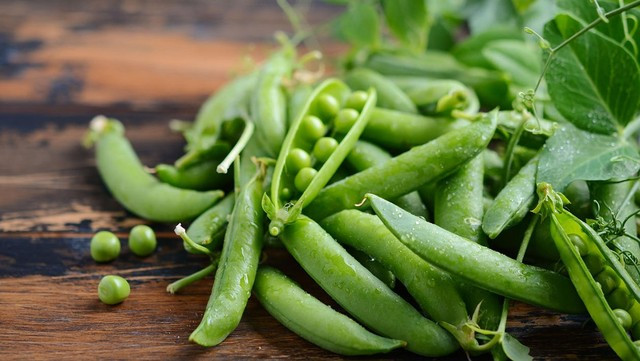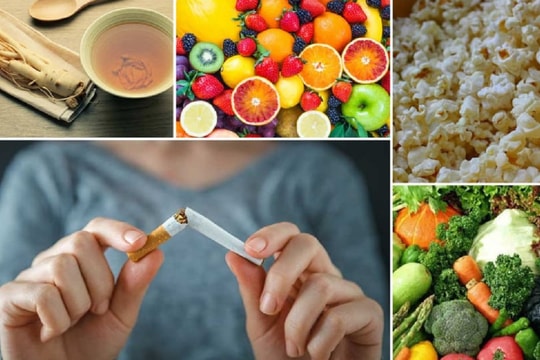15 Best Vitamin C Rich Foods to Boost Immunity
There are few vitamins that have as many benefits as vitamin C, which is both an essential nutrient and a powerful antioxidant that helps boost the body's immune system.
1. Benefits ofvitamin Cwith immunity
According to Associate Professor, Dr. Nguyen Thi Lam - former Deputy Director of the National Institute of Nutrition, vitamin C is a factor involved in the immune system because vitamin C participates in the production of factors related to the immune system and antibodies.
Vitamin C is a water-soluble vitamin that acts as an antioxidant and plays an important role in the body's immune function. Studies have also shown vitamin C's potential to promote collagen formation, aid in cancer treatment, and reduce the risk of other diseases such as gout.
Vitamin C deficiency can cause symptoms such as easy bruising, bleeding gums, fatigue, weakened immunity, etc. Adequate vitamin C intake can help reduce symptoms and shorten the duration of respiratory infections such as colds, bronchitis or sinusitis. In addition, it can also improve and reduce the incidence of other diseases such as pneumonia, malaria and diarrhea.
Foods of natural origin have long been recognized as effective sources of vitamin C. Since our bodies do not store or synthesize vitamin C, it is extremely important to include plenty of fruits and vegetables containing vitamin C in our daily diet.
2. The best vitamin C rich foods to help boost immunity
According to the United States Department of Agriculture's National Nutrient Database, there are many foods that naturally contain vitamin C, which are not only rich in vitamin C but also low in calories and packed with other nutrients that are beneficial to health.
1. Guava
Guava is a fruit with high antioxidant capacity, providing a large amount of vitamin C, in addition to vitamin A, B and some other minerals. Therefore, it is very good for the immune system. Guava has also been shown to benefit blood pressure, digestion, blood sugar levels, and heart health.
The amount of vitamin C in 1 cup of guava (165 grams), contains 376 milligrams (418% Daily Value)
2. Black grapes
Black grapes are high in vitamin C, and also provide good amounts of manganese, iron, potassium, and other micronutrients, including anthocyanins.
In 1 cup of black grapes (112 grams), there are 203 milligrams of vitamin C (225%).
3. Red pepper
Red peppers are rich in essential nutrients, including vitamin C. Eating red peppers also helps support heart health, metabolism, digestion, and healthy immune function.
1 cup (149 grams) of chopped red peppers contains 191 milligrams of vitamin C (212%).
4. Green bell peppers
Green bell peppers are definitely a great source of vitamin C which helps boost immunity, prevent disease and maintain weight.
The vitamin C content in 1 cup (149 grams) of chopped green bell peppers contains 120 milligrams of vitamin C (133%).
5. Kiwi
Kiwis are packed with antioxidants, including vitamin C along with vitamins K and E, potassium, copper, and folate. They benefit skin, respiratory, eye, gut, heart, bone, and immune health.
One cup (180 grams) of kiwi contains 134 milligrams of vitamin C (149%).
6. Kale
Kale is a leafy green vegetable that is particularly nutritious because it provides many important micronutrients. In addition to vitamin C, kale is also high in vitamin K, which helps boost immunity and promote bone health.
7. Lemon
Citrus fruits are among the richest sources of vitamin C, including lemons. Not only are they used to help treat and prevent scurvy due to their high vitamin C content, but lemons also boost the health of the immune system, heart, kidneys, and skin.
1 cup (212 grams) of lemon contains 112 milligrams of vitamin C (124%).
8. Orange
A top vitamin C rich fruit, oranges also provide folate, thiamine, potassium, vitamin A, calcium, vitamin B6, pantothenic acid, fiber, and magnesium. Orange nutrition has many health benefits, including helping to treat the common cold, improve heart health, boost brain function, and keep skin healthy and beautiful.
1 cup (185 grams) of oranges contains 83 milligrams of vitamin C (92%).
9. Grapefruit
Like oranges, kiwis, lemons, and other citrus fruits, grapefruit is rich in vitamins C and A, B, potassium, calcium, and magnesium. Eating grapefruit is good for weight control and may even reduce the risk of stroke.
1 cup (230 grams) of grapefruit contains 72 milligrams of vitamin C (80% DV).
10. Strawberries
In addition to vitamin C, strawberries also provide a good amount of manganese, B vitamins, iron, potassium, vitamin K and several other nutrients.
This delicious fruit helps protect the body against heart disease, skin damage, neurodegenerative diseases and is high in fiber which aids detoxification.
One cup (166 grams) of sliced strawberries contains 97 milligrams of vitamin C (108%).
11. Papaya
Rich in vitamin C, vitamin A, vitamin E and vitamin K, eating papaya is beneficial for digestion and heart health. It is also a great food for people with asthma.
1 cup (145 grams) of sliced papaya contains 88 milligrams of vitamin C (98%).
12. Pineapple
The benefits of pineapple are numerous due to its vitamin C, fiber, and other essential nutrients. Pineapple helps aid digestion and boosts immunity. In addition, research shows that pineapple also has potential benefits for heart health and improving asthma.
One cup of chopped pineapple contains 79 milligrams of vitamin C (88%).
13. Durian
Durian is considered by experts to be a very nutritious fruit, especially rich in vitamin C, B vitamins (including thiamine, vitamin B6 and riboflavin), manganese and potassium. In addition, it also provides you with a variety of antioxidant compounds such as anthocyanins, carotenoids, polyphenols and bioflavonoids (these compounds are also found in berries, cocoa, red wine and green tea). However, it is a fatty fruit, with a higher calorie content than most fruits.
1 cup (243 grams) of raw durian contains 48 milligrams of vitamin C (80%).
14. Broccoli
As one of the top vegetables with the highest amount of vitamin C, broccoli also contains fiber; vitamins K, A and B6; folate, manganese, potassium, phosphorus, magnesium and calcium.
The vitamin C content in 1 cup of broccoli is 69 milligrams (77%).
15. Peas
Peas are rich in vitamin C and several other important nutrients, including: protein, fiber, vitamin K, manganese, thiamine, vitamin A, folate, phosphorus, B6, niacin, magnesium, riboflavin, copper, iron, zinc, and potassium.
Therefore, eating peas not only helps boost immunity but can also aid weight loss, provide an excellent source of plant protein, aid blood sugar control and promote healthy digestion.
One cup (160 grams) of cooked peas contains 23 milligrams of vitamin C (25%).

Although vitamin C is found in many foods, foods highest in vitamin C are primarily fruits and vegetables.
Nutritionists advise us to choose this food source instead of using vitamin C supplements. Foods of natural origin not only provide vitamin C but can also provide many other important vitamins and minerals, especially preventing the risk of adverse side effects that can occur when supplementing too much vitamin C (such as increased risk of kidney stones)./.









